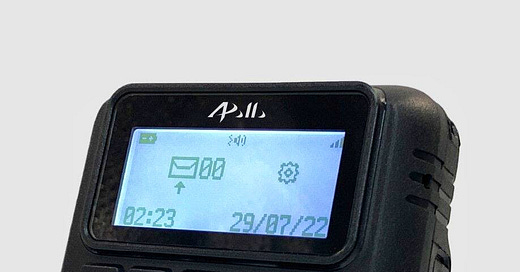Objects are losing their innocence
Faith, trust, paranoia: the emotional life of supply chains
Two and a half weeks ago, Israel launched the latest phase in its struggle against Hezbollah with an unconventional tactic. It detonated explosive devices that it had somehow planted in thousands of pagers and radios used by members of the Shia group. With attention focused on the threat of a widening conflagration in the Middle East, I think most people have yet to appreciate the implications of this event. If handheld devices can be turned into bombs, then a few terrorist incidents may be enough to sow chaos in the global economy.
As far as I’m aware, it’s still unclear how exactly Israel managed to pull off its pager attack, so we shouldn’t jump to conclusions. Still, some concern is warranted. The hardware and electronics hacker Andrew Huang has written a detailed and – to my admittedly untrained eye – disturbingly plausible explanation of how lithium pouch batteries, which are used in various kinds of gadget, might be converted into explosive devices. And even if Huang is wrong about the technicalities, his broader point seems indisputable: because the supply chains behind our products are now so complex and anonymous, often incorporating materials and components from dozens or hundreds of sources, they offer abundant opportunities for infiltration.
There is already plenty of evidence of this. In 2020, anti-fraud investigators found pre-installed malware on tens of thousands of mobile phone handsets in numerous African countries. Transsion, the Chinese company that manufactured the phones, said the code had been installed by an unidentified vendor in its supply chain. Or take a less high-tech example. Bloomberg recently reported that the surging price of olive oil, the result of droughts in the Mediterranean, is incentivising criminals to fabricate substitutes. One investigation in Rome found at least 50 restaurants selling fake extra-virgin olive oil, which suppliers had concocted with substances such as chlorophyll and beta-carotene. In April, the Director of the FBI warned companies to guard their “hardware and supply chains” against Chinese espionage.
As Huang points out, supply chain attacks are potentially devastating because they threaten “the erosion of public trust in everyday things.” Indeed, the modern economy relies on our willingness to buy products without knowing how they are made, or what they might contain. The irony is that this very inscrutability was once celebrated as the great virtue of free-market capitalism – even, perhaps, an indication of divine agency.
In the 1950s and 60s, the author Leonard Read penned numerous works praising the mystery of supply chains. The most famous of these was the 1958 essay “I, Pencil,” where Read demonstrated that even this humble object required so many different processes, materials and skills for its production that (speaking from the pencil’s perspective) “not a single person on the face of this earth knows how to make me.” Like many British proponents of free trade during the nineteenth century, Read’s ideas where infused with Christian convictions. He described the workings of the market as “miraculous,” observing that “we are so dumbfounded by the mystery of life that we readily concede that only God can make a tree – or a man. But there is all too little faith and humility as it concerns the market. Here… in fact, we are viewing an order the complexity of which cannot be brought within our limited grasp.”
It’s not too much of an exaggeration to say that some of this faith found its way into the hearts of policymakers in the post-Cold War period, as they oversaw the great globalisation which has made supply chains ever more intricate, fragmented and dispersed. After all, Read’s parable of the pencil was adopted by Milton Friedman, one of the twentieth century’s most influential economists, in a TV broadcast addressing “the real nature of freedom.”
For all the material blessings that the global division of labour has produced – and some of its achievements are, indeed, awe-inspiring – it now appears to have invited a little too much trust. The complacency of the United States and other Western countries has created opportunities for their antagonists. Most obviously, China now controls the mining and processing of various critical resources, including lithium, cobalt, manganese and rare earth elements, helping it to dominate the global market for technologies such as electric vehicles, lithium ion batteries and solar panels.
The very prospect of supply chains being infiltrated by fraudsters, terrorists, and other malicious actors is symptomatic of the growing disorder that threatens globalisation under the American empire. We have become accustomed to trusting objects not through active faith, but unconscious habit. The unravelling of that trust would mark a significant shift not just in economic and political terms, but in our everyday lives.





This kind of hyper specialization and reliance on supply chains also carries the risk of disaster even where there are no bad actors. Obligatory reference to E.M. Forster's "The Machine Stops."
Leonard Read history reminded me of Thomas Thwaites trying to build a toaster from scratch going after all the 400 necessary components and material neeeded to make it, in this strife he concluded that "it takes a civilization to build a toaster"
And the globalization with its division of labor? Alienation Marx talked about on steroids. And then some people from the sunny California think that more technology will save us all.. the chinese too, they have embraced the high tech utopia, and is advancing ever since Mao:
"We cannot use the “natural rights of man” nor the “theory of evolution.”
We can only use Western technology"
Without any doubt this is something that need be stopped, be it a war or collapse, because EROI, may EROI bring some Eros again after unleashing some Thanatos on the cattle/cybernetic anthill.